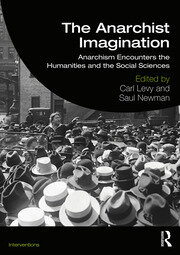Toward an anarchist-feminist analytics of power
Sandra Jeppesen | 2019 | chapter in The Anarchist Imagination: Anarchism Encounters the Humanities and the Social Sciences
This is a broad ranging introduction to twenty-first-century anarchism which includes a wide array of theoretical approaches as well as a variety of empirical and geographical perspectives. The book demonstrates how the anarchist imagination has influenced the humanities and social sciences including anthropology, art, feminism, geography, international relations, political science, postcolonialism, and sociology.
In this chapter, Sandra Jeppesen develops a working definition of anarchist-feminism and proposes an anarchist-feminist analytics of power. Anarchist-feminists have been engaged globally in political organizing and theorizing since the outset of the anarchist movement in the late eighteenth and early nineteenth centuries. Despite this, Margaret Marsh has found that ‘very little scholarly attention has been focused on anarchist women, with the exception of Emma Goldman, who was not fully representative’ (Marsh 1978: 533). Deric Shannon (2009: 59) similarly argues that ‘articles articulating or utilizing a distinctly anarcha-feminist perspective are rarely found in academic journals’, leaving anarchist-feminist theory under-articulated. Writers propose various reasons: Marx has theorized capitalism so anarchist-feminists need not; anarchist-feminists believe theory to be elitist; and anarchist-feminists prefer action to theory. We may also observe that women, especially racialized and colonialized women, have disproportionate responsibilities for work both inside and outside the home, as well as an unequal portion of organizing work falling to them, leaving less time for theorizing. Moreover, anarchist-feminist academics may tend to produce time-consuming collaborative work, whereas anarchist men tend to produce individual work.
More cross-pollination is needed between anarchist theories of the state and capital, and feminist theories of gender, queer, trans, race, colonialism, and ecology. There is a growing emergence of global anarchist-feminist research on a wide range of issues.

